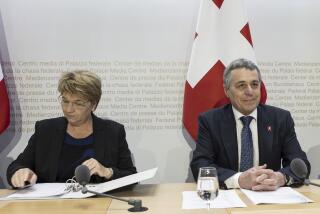Soviets Tell New Idea for Reunifying Germany
- Share via
BONN — A conference on German reunification could be held this year under the auspices of the 35 signatories of the Helsinki accords, a Soviet official declared Friday in East Berlin.
The official, Foreign Ministry spokesman Yuri A. Gremitskikh, told a news conference that a reunited Germany must be neutral, as proposed Thursday by East German Prime Minister Hans Modrow. However, the concept of a neutralized, reunited Germany was firmly rejected by West German Chancellor Helmut Kohl and other German leaders.
Nonetheless, Gremitskikh argued, “We believe it unrealistic to think that a united Germany could be in NATO. We think it is a good conclusion that the two (nations) should leave the military blocs.”
Western diplomats in Bonn indicate that the Soviet official’s idea of a conference overseen by the Helsinki accords countries, which include the United States, the Soviet Union and European nations, has great appeal. The 35 nations are represented in long-running talks in Vienna.
“The Helsinki . . . countries might be the best venue for developing a formula and timetable for German reunification,” one senior diplomat said. “And the same conference could conclude a final peace treaty between Germany and the four allied powers, the U.S., the Soviet Union, Britain and France.”
In Moscow on Friday, Soviet Foreign Minister Eduard A. Shevardnadze offered the strongest Kremlin endorsement yet of a united Germany, but he repeated long-standing Soviet conditions that the process not happen too quickly or cause instability in Europe.
Moreover, he said that Europe, the United States and Canada suffered so much at the hands of the Nazis that their people should vote on the question of German reunification.
Speaking to Soviet journalists, Shevardnadze also said that German unity must depend on firm guarantees that no threat of war could ever arise from a new German state.
For years, diplomatic analysts have speculated that Moscow might play the “German card”--that is, making an offer the West Germans presumably could not refuse, such as reunification in exchange for neutrality and the severing of ties to the North Atlantic Treaty Organizaton.
The fear expressed by some was that a neutral Germany would then develop close ties with the Soviet Union and the East Bloc nations, leaving the European Community in the lurch.
But events have swiftly overtaken that scenario, according to diplomats here. “The Soviets are now playing the German card,” one said. “But it’s far too late in the game.”
In Bonn, Horst Teltschik, security adviser to Kohl, pointed out that most ideas for German reunification have been overtaken by fast-paced events and predicted that the pace would quicken after March 18 elections in East Germany.
He appeared to support the thinking of many political observers that the East German electorate is moving much more rapidly toward reunification than has been proposed by national leaders, who favor a measured approach.
More to Read
Sign up for Essential California
The most important California stories and recommendations in your inbox every morning.
You may occasionally receive promotional content from the Los Angeles Times.













